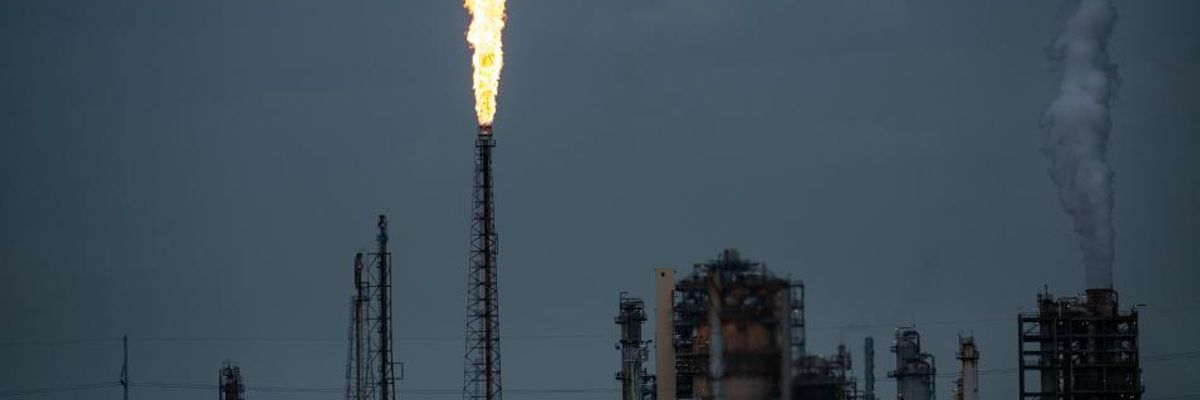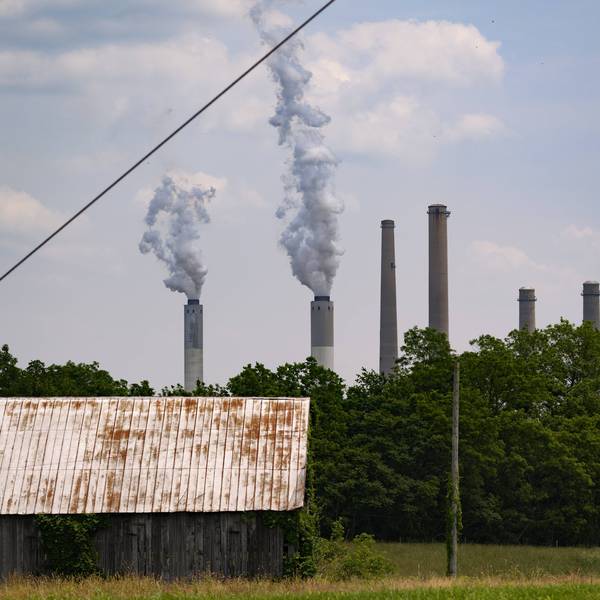
A gas flare from the Shell Chemical LP petroleum refinery illuminates the sky on August 21, 2019 in Norco, Louisiana. (Photo: Drew Angerer/Getty Images)
With Dirty Energy Sector Crashing, Nearly 70 Groups Urge Fed to Stop Buying Up Wasteful Fossil Fuel Industry Debt
"The Fed needs to reduce systemic risk during this health and economic crisis and stop boosting the industry driving climate devastation."
A coalition of nearly 70 advocacy organizations is demanding that the Federal Reserve immediately stop using its emergency Covid-19 lending facilities to buy up fossil fuel debt, warning that rescuing the faltering oil and gas industry is both a bad investment of public money and disastrous for the climate.
The Federal Reserve Board's "decision to use public funds to subsidize the fossil fuel sector exposes the nation to significant financial losses, both due to sunk costs in failed projects and the fallout from lawsuits over environmental catastrophe," wrote 69 environmental, religious, and economic justice organizations in a letter (pdf) to Fed Chairman Jerome Powell on Thursday.
"The Fed should be doing everything it can to slow and ultimately halt the freight train of economic risk bearing down on us because of the climate crisis. But with actions like these, it's shoveling coal into the boiler."
--David Arkush, Public Citizen
"The board should not be purchasing the debts of firms that accelerate climate change by expanding fossil fuels, create real risks of local environmental catastrophe, and threaten the lands of Indigenous people," the letter reads. "The board's investment in these firms means the public now also shares a part of these risks."
The groups point to a July 17 report by the non-partisan think tank InfluenceMap showing that the Fed has purchased around $748 million in fossil fuel industry bonds since the launch of its sprawling bailout effort in May.
"The Fed has previously warned of the financial risks of fossil fuels, as well as the monetary damages associated with environmental catastrophe," Collin Rees, senior campaigner at Oil Change International, said in a statement. "But the Fed is now investing public dollars in the debt of the same companies it warned others about."
"Instead of intensifying risks to financial stability by supporting the fossil fuel sector," said Rees, "the Fed needs to reduce systemic risk during this health and economic crisis and stop boosting the industry driving climate devastation."
In a New York Times op-ed in May, former Fed board member Sarah Bloom Raskin noted that fossil fuel companies "now hold $744 billion in bonds and debt, much of it below investment grade or close to it."
"Almost 83 percent of the industry's debt is now eligible for cheap refinancing by the Fed," Raskin wrote. "For taxpayers, shouldering these liabilities is a bad deal. Buying this bad debt is not likely to support the creation of jobs or even ensure that existing jobs survive."
David Arkush, climate program director at Public Citizen, echoed Raskin in a statement Thursday, warning that "through these debt purchases, the Fed is exposing the public to financial losses through credit risk, market risk, and operational risk due to exacerbation of the climate crisis."
"The Fed should be doing everything it can to slow and ultimately halt the freight train of economic risk bearing down on us because of the climate crisis," said Arkush. "But with actions like these, it's shoveling coal into the boiler."
An Urgent Message From Our Co-Founder
Dear Common Dreams reader, The U.S. is on a fast track to authoritarianism like nothing I've ever seen. Meanwhile, corporate news outlets are utterly capitulating to Trump, twisting their coverage to avoid drawing his ire while lining up to stuff cash in his pockets. That's why I believe that Common Dreams is doing the best and most consequential reporting that we've ever done. Our small but mighty team is a progressive reporting powerhouse, covering the news every day that the corporate media never will. Our mission has always been simple: To inform. To inspire. And to ignite change for the common good. Now here's the key piece that I want all our readers to understand: None of this would be possible without your financial support. That's not just some fundraising cliche. It's the absolute and literal truth. We don't accept corporate advertising and never will. We don't have a paywall because we don't think people should be blocked from critical news based on their ability to pay. Everything we do is funded by the donations of readers like you. Will you donate now to help power the nonprofit, independent reporting of Common Dreams? Thank you for being a vital member of our community. Together, we can keep independent journalism alive when it’s needed most. - Craig Brown, Co-founder |
A coalition of nearly 70 advocacy organizations is demanding that the Federal Reserve immediately stop using its emergency Covid-19 lending facilities to buy up fossil fuel debt, warning that rescuing the faltering oil and gas industry is both a bad investment of public money and disastrous for the climate.
The Federal Reserve Board's "decision to use public funds to subsidize the fossil fuel sector exposes the nation to significant financial losses, both due to sunk costs in failed projects and the fallout from lawsuits over environmental catastrophe," wrote 69 environmental, religious, and economic justice organizations in a letter (pdf) to Fed Chairman Jerome Powell on Thursday.
"The Fed should be doing everything it can to slow and ultimately halt the freight train of economic risk bearing down on us because of the climate crisis. But with actions like these, it's shoveling coal into the boiler."
--David Arkush, Public Citizen
"The board should not be purchasing the debts of firms that accelerate climate change by expanding fossil fuels, create real risks of local environmental catastrophe, and threaten the lands of Indigenous people," the letter reads. "The board's investment in these firms means the public now also shares a part of these risks."
The groups point to a July 17 report by the non-partisan think tank InfluenceMap showing that the Fed has purchased around $748 million in fossil fuel industry bonds since the launch of its sprawling bailout effort in May.
"The Fed has previously warned of the financial risks of fossil fuels, as well as the monetary damages associated with environmental catastrophe," Collin Rees, senior campaigner at Oil Change International, said in a statement. "But the Fed is now investing public dollars in the debt of the same companies it warned others about."
"Instead of intensifying risks to financial stability by supporting the fossil fuel sector," said Rees, "the Fed needs to reduce systemic risk during this health and economic crisis and stop boosting the industry driving climate devastation."
In a New York Times op-ed in May, former Fed board member Sarah Bloom Raskin noted that fossil fuel companies "now hold $744 billion in bonds and debt, much of it below investment grade or close to it."
"Almost 83 percent of the industry's debt is now eligible for cheap refinancing by the Fed," Raskin wrote. "For taxpayers, shouldering these liabilities is a bad deal. Buying this bad debt is not likely to support the creation of jobs or even ensure that existing jobs survive."
David Arkush, climate program director at Public Citizen, echoed Raskin in a statement Thursday, warning that "through these debt purchases, the Fed is exposing the public to financial losses through credit risk, market risk, and operational risk due to exacerbation of the climate crisis."
"The Fed should be doing everything it can to slow and ultimately halt the freight train of economic risk bearing down on us because of the climate crisis," said Arkush. "But with actions like these, it's shoveling coal into the boiler."
A coalition of nearly 70 advocacy organizations is demanding that the Federal Reserve immediately stop using its emergency Covid-19 lending facilities to buy up fossil fuel debt, warning that rescuing the faltering oil and gas industry is both a bad investment of public money and disastrous for the climate.
The Federal Reserve Board's "decision to use public funds to subsidize the fossil fuel sector exposes the nation to significant financial losses, both due to sunk costs in failed projects and the fallout from lawsuits over environmental catastrophe," wrote 69 environmental, religious, and economic justice organizations in a letter (pdf) to Fed Chairman Jerome Powell on Thursday.
"The Fed should be doing everything it can to slow and ultimately halt the freight train of economic risk bearing down on us because of the climate crisis. But with actions like these, it's shoveling coal into the boiler."
--David Arkush, Public Citizen
"The board should not be purchasing the debts of firms that accelerate climate change by expanding fossil fuels, create real risks of local environmental catastrophe, and threaten the lands of Indigenous people," the letter reads. "The board's investment in these firms means the public now also shares a part of these risks."
The groups point to a July 17 report by the non-partisan think tank InfluenceMap showing that the Fed has purchased around $748 million in fossil fuel industry bonds since the launch of its sprawling bailout effort in May.
"The Fed has previously warned of the financial risks of fossil fuels, as well as the monetary damages associated with environmental catastrophe," Collin Rees, senior campaigner at Oil Change International, said in a statement. "But the Fed is now investing public dollars in the debt of the same companies it warned others about."
"Instead of intensifying risks to financial stability by supporting the fossil fuel sector," said Rees, "the Fed needs to reduce systemic risk during this health and economic crisis and stop boosting the industry driving climate devastation."
In a New York Times op-ed in May, former Fed board member Sarah Bloom Raskin noted that fossil fuel companies "now hold $744 billion in bonds and debt, much of it below investment grade or close to it."
"Almost 83 percent of the industry's debt is now eligible for cheap refinancing by the Fed," Raskin wrote. "For taxpayers, shouldering these liabilities is a bad deal. Buying this bad debt is not likely to support the creation of jobs or even ensure that existing jobs survive."
David Arkush, climate program director at Public Citizen, echoed Raskin in a statement Thursday, warning that "through these debt purchases, the Fed is exposing the public to financial losses through credit risk, market risk, and operational risk due to exacerbation of the climate crisis."
"The Fed should be doing everything it can to slow and ultimately halt the freight train of economic risk bearing down on us because of the climate crisis," said Arkush. "But with actions like these, it's shoveling coal into the boiler."

